Comprehensive guide to payroll salary compensation, benefits, and allowances in the Philippines
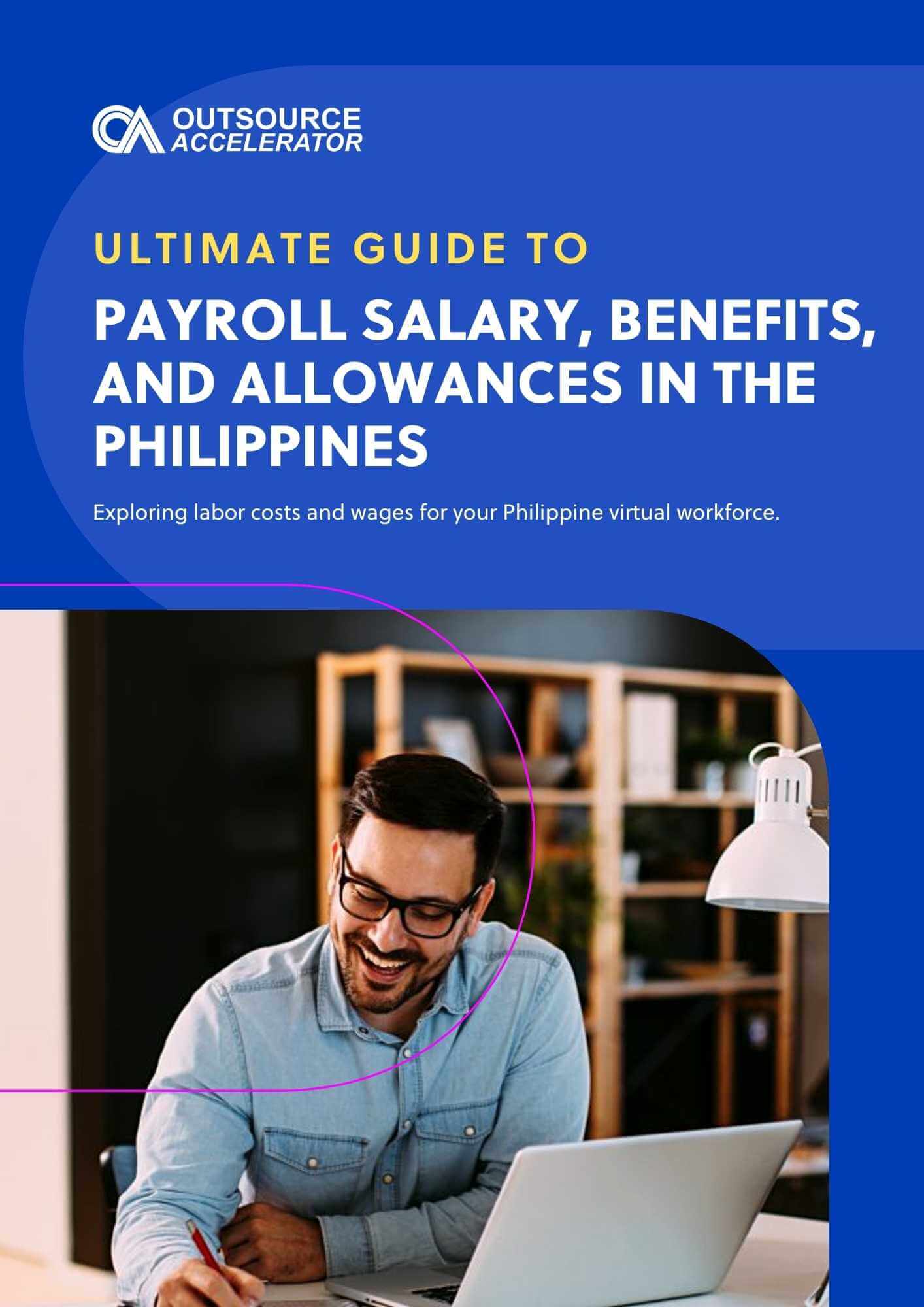

Get the easy-read PDF version to your inbox now
In order to outsource effectively, it helps to be familiar with the different salary brackets that exist in the Philippines. Salaries and compensation packages can often be difficult to understand and for most people, the computation can be confusing especially if you are halfway around the world.
We will be simplifying and explaining everything about salaries and compensation in the Philippines down to the most minute detail. This may seem like a lot to take in, but these things are usually handled by the BPO service provider when you sign up with them – and typically they will wrap all of these costs, administration – and guidance – into one simple pricing structure.
Below, we also provide a table of expected Philippines salaries for 21 common job roles, and the comparative rates for those jobs in US, UK and Australia. Possibly one the biggest ‘salary-surprises’ foreign people get when employing Filipinos is the “13th month” (or possibly even 14th, 15th etc) salary payment. We explain this below, in our comprehensive guide.
A closer look at BPO industry wages
Projected to join the top 20 largest economies in the world by the year 2050, the Philippines is currently the 2nd fastest growing economies in East Asia in 2017 with a gross domestic product (GDP) annual growth rate of 6.60%. Trading Economics estimates that the country’s GDP per capita will reach USD 2,970 by the 4th quarter of 2018 and USD 3,170 by 2020.
Among the major contributors to this growth are the country’s high public infrastructure spending, which reached a record high of USD 17.7 billion in 2017, as well as older economic drivers such as overseas remittances, consumer spending, and its strong and ever expanding information technology and business process management (IT-BPM) industry.
IT-BPM is at the top of the list of industries in the Philippines when it comes to offering jobs and hiring people. At the same time, the industry is also one of the largest contributors to the country’s economy.
The 2014 Annual Survey of Philippine Business and Industry (ASPBI) – Business Process Management (BPM) Activities for All Employment Sizes, a survey conducted by the Philippine Statistics Authority and involved a total of 1,461 BPM establishments, revealed that the industry created a total of 525,867 jobs in the same year.
Jobs like customer relationship management employed the most number of people, leading the list with over 354,000 jobs. In the far second and third places are the sales and marketing and computer programing activities, each with over 72,000 and 35,000 jobs respectively.
According to the said survey, the average annual compensation for those employed in the industry is USD 7,605. Those employed under the software publishing sector received the highest annual compensation per employee at an average of USD 22,788, followed by those in finance and accounting activities at USD 15,724, and administrative support at USD 12,592. Those employed under document processes activities have the lowest recorded annual salary in the industry, taking home an average of USD 4,033 annually.
It should be noted, however, that the data provided by the survey is quite dated and the industry has taken great steps to diversify the services offered in the country in the wake of the wide AI adoption. For more recent information, one can look at the data provided by JobStreet, one of the leading online job portals in the country. The company’s Salary Report 2017 reported that the BPO industry offered the most number of jobs last year, with over 71,000 openings.
Basic wage
In the Philippines (and in other countries as well), basic wages usually range differently for different types of jobs. For Non-Agricultural members or workers who live or work in the National Capital Region (ie Makati), the basic wage as of October 2017 is $10 per day. For NCR workers who are working in Agriculture, Retail/Service Establishments who has 15 or fewer workers, and manufacturing establishments employing less than 10 workers, the basic minimum wage is $9 per day
For the past couple of years, the BPO industry has been booming. The industry is known for spoiling its employees with wages that are higher than the usual, packaged with loads of benefits such as health cards, vacation and sick leaves, bonuses, and so much more. According to PayScale, Customer Service Representatives or CSRs get about $3,000-7,000 per annum.
Operations Managers that are working in the BPO Industry ranges from $7,000-27,000 per annum. For Data Analysts, the range is about $2,000-8,500 per annum. It’s always a win-win situation for people belonging to the BPO industry. Foreign companies can save up to 70% with salaries if they choose to outsource to the Philippines.
Wages in the Philippines are much lower compared to the USA, the UK, and Australia, which is why more and more foreign companies are choosing to employ Filipinos. On the other hand, this situation is also a great opportunity for the Filipino workers, as this only means more jobs will be available, and the pay will be higher compared to other jobs.
Entry level
According to Payscale, an entry-level tech support specialist based in the Philippines can earn USD 4,487 per year. Entry-level technical support representatives can earn an average of USD 4,142 annually. Customer service representative who are just starting out in their careers take home USD 4,098 per year. Information technology specialists earn USD 4,534 on the average.
JobStreet defines junior executive level positions as those that require less than 5 years of work experience. The company’s Salary Report 2017 revealed that the highest paid junior executives in the country are employed in IT-related sectors, with an average monthly salary of USD 703. Customer service-related work, on the other hand, placed 9th in the list of highest earning sectors in this job level, taking home an average of USD 470 per month.
It should be noted that the IT-BPM industry is also aggressively hiring in other specializations like healthcare and finance. Legal services is 2nd in the list of high-earning junior positions at USD 559, banking and finance junior executives are 4th with an average monthly salary of USD 516, and healthcare related work is 7th with an average monthly salary of USD 506.
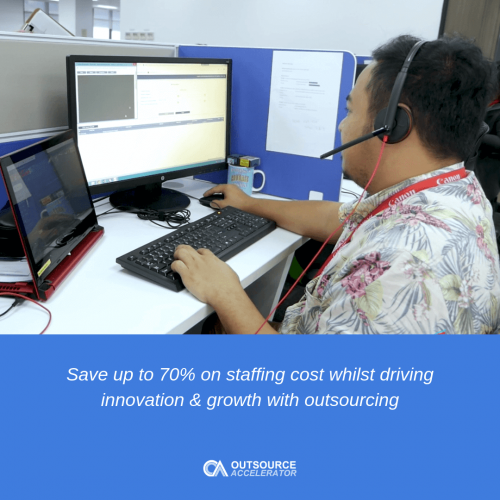
Supervisory level
Supervisor level positions refer to jobs that require 5 to 10 years of experience. According to JobStreet, experience in the same line of work has generally increased in the past year. Still leading the list of highest paid workers are IT specialists at USD 1,305 monthly. Law and legal services is in 3rd place with an average of USD 912 monthly, and banking and finance services is in 5th with USD 738.
Technical support representatives and technical support specialists in this phase of their careers take home an average of USD 5,414 and USD 5,730 annually, respectively. Customer service representatives earn USD 5,340, and information technology specialists earn USD 6,727 per year.
Managerial level
Last but definitely not the least are those in managerial positions, which require more than 10 years of experience. Those in corporate strategy are the highest paid in this category, with an average monthly earning of USD 2,392, followed by those in IT-related professions at USD 1,730. Customer service-related managerial positions occupy the 5th place in the highest paid in this category, earning USD 1,535 per month.
Payscale’s annual wage data for professionals in this career level are as follows: technical support representatives at USD 6,096, technical support specialists at USD 5,839, customer service representatives at USD 5,842, and IT specialists at USD 12,685.
Freelancer rates
The Philippines is also a top destination for companies that employ freelancers. Consultants and freelancing professionals usually charge by the hour, but they also often search for work using online platforms that charge clients or employers depending on the milestones they achieve towards completing the project.
Single projects may be paid a flat fee, while others, like data encoding and translation work, can be paid by the number of words. Often, tasks like mobile app development, content marketing, and media editing are contracted to freelancers.
Some of the more common freelancing gigs in the country include virtual assistance, search engine optimization (SEO), and creative work.
On the average, virtual assistants in the country earn a starting salary of USD 4,330 and a mid-career salary of USD 6,672 annually. This job typically involves administrative tasks like email filtering, blog management, transcription, data entry, and hotel and flight bookings.
SEO specialists are concerned with keyword research, website optimization, link building, and market research. They typically take home USD 4,655 at the start of their career and USD 5,581 with a few years of experience.
Content writers develop media content and start with a median annual salary of USD 4,166, which can reach an average of USD 7,837 by their midlevel.
Graphic artists create visual concepts and develop production design and overall layout. They earn an average annual salary of USD 3,448 at entry level and reach USD 3,955 midcareer, and USD 5,489 with enough experience.
Wage trends
In general, IT-related specialists continue to receive the best salaries for both the entry level and supervisory level, and BPO jobs continue to flourish across all levels in the country. In particular, there are still plenty of positions for customer services and technical-related jobs, but there have also been a lot of job openings in other BPO-related specializations, signaling an increase in the diversity of jobs found within the industry.
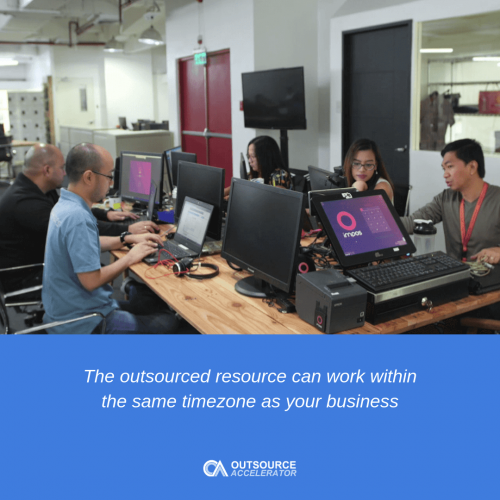
Chart showing average annual salary in the Philippines for common roles
| Job Title | Entry | Junior | Senior |
| Accountant | $4,742 | $7,025 | $7,782 |
| Call center agent | $3,706 | $4,587 | $5,633 |
| Copywriter | $4,629 | $5,845 | $7,483 |
| Graphic artist | $3,468 | $4,029 | $5,523 |
| HR manager | $6,957 | $9,504 | $11,290 |
| Project manager | $10,270 | $13,949 | $21,198 |
| SAP consultant | $9,418 | $17,805 | $27,214 |
| Software developer | $6,668 | $10,676 | $14,601 |
| Systems administrator | $6,877 | $9,023 | $9,734 |
| Systems analyst | $6,728 | $11,966 | $13,759 |
| Team leader | $7,230 | $9,106 | $13,759 |
| Technical support representative | $4,169 | $5,448 | $6,134 |
| Virtual assistant | $4,039 | $6,714 | $8,682 |
*Average annual salary in USD
These figures may not seem much from a western perspective, but it allows workers to fully support themselves and their families and save money for investments and emergencies. In addition to a basic wage, workers also get health benefits and are enrolled in various programs that can offer them financial assistance in times of calamity, sickness, or other similar events.
Country-based salary comparisons
The minimum daily wage for non-domestic workers in the National Capital Region (NCR) is USD 9 per day or about USD 1.1 per hour. In comparison, the national minimum wage in the U.S. is USD 7.25 per hour, with many states requiring a minimum wage that is higher than federally mandated. The highest minimum wage is USD 11.50 per hour in Washington.
The annual average wage in the Philippines is approximately USD 5,129. On the other hand, the annual average wage in the United States is USD 60,200; in the United Kingdom, it’s USD 42,800; and USD 52,063 in Australia. To compare,
Chart comparing Philippine salaries to US, UK and Australian salaries
Outsource Accelerator has created an infographic showing the average annual salaries of employees based in the Philippines, USA, UK, and Australia who are performing similar roles:
| Job Description | Philippines (in PHP) | USA (in USD) | UK (in GBP) | AUS (in AUD) | |
| HR Manager | ₱507,387 | $78,007 | £35,813 | $90,243 | |
| in USD | $9,506 | $78,007 | $46,669 | $66,518 | |
| saving % | n/a | 88% | 80% | 86% | |
| SAP Consultant | ₱616,593 | $76,798 | £37,489 | $96,928 | |
| in USD | $11,552 | $76,798 | $48,818 | $71,445 | |
| saving % | n/a | 85% | 77% | 84% | |
| Software Developer | ₱385,424 | $81,994 | £30,651 | $85,000 | |
| in USD | $7,221 | $81,994 | $39,913 | $62,653 | |
| saving % | n/a | 91% | 82% | 88% | |
| Software Engineer | ₱444,778 | $109,087 | £34,142 | $85,000 | |
| in USD | $8,333 | $109,087 | $44,459 | $62,653 | |
| saving % | n/a | 92% | 81% | 87% | |
| Technical Support Representative | ₱247,555 | $36,924 | £38,570 | $51,869 | |
| in USD | $4,638 | $36,924 | $35,225 | $38,232 | |
| saving % | n/a | 87% | 87% | 88% | |
| IT Representatives (Entry Level) | ₱305,414 | $61,758 | £19,000 | $81,316 | |
| in USD | $5,722 | $61,758 | $24,741 | $59,938 | |
| saving % | n/a | 91% | 77% | 90% | |
| Team Leaders | ₱381,741 | $75,823 | £23,940 | $61,632 | |
| in USD | $7,152 | $75,823 | $31,174 | $45,428 | |
| saving % | n/a | 91% | 77% | 84% | |
| Systems Analyst (3-5 yrs experience) | ₱509,042 | $63,924 | £30,062 | $64,601 | |
| in USD | $9,537 | $63,924 | $39,146 | $47,617 | |
| saving % | n/a | 85% | 76% | 80% | |
| Systems Admin (3-5 yrs experience) | ₱381,741 | $72,760 | £25,422 | $75,137 | |
| in USD | $7,152 | $72,760 | $33,104 | $55,383 | |
| saving % | n/a | 90% | 78% | 87% | |
| Assistant Manager (2-4 yrs experience) | ₱879,895 | $57,121 | £34,000 | $45,503 | |
| in USD | $16,485 | $57,121 | $44,274 | $33,540 | |
| saving % | n/a | 71% | 63% | 51% | |
| Project Manager (2-4 yrs experience) | ₱1,145,331 | $108,000 | £44,000 | $116,714 | |
| in USD | $21,458 | $108,000 | $57,296 | $86,029 | |
| saving % | n/a | 80% | 63% | 75% | |
| Senior Project Manager (12+ yrs experience) | ₱2,647,851 | $102,318 | £61,698 | $146,371 | |
| in USD | $49,608 | $102,318 | $80,343 | $107,890 | |
| saving % | n/a | 52% | 38% | 54% | |
| Program Director (12+ yrs experience) | ₱3,710,024 | $94,623 | £112,097 | $153,750 | |
| in USD | $69,508 | $94,623 | $145,972 | $113,329 | |
| saving % | n/a | 27% | 52% | 39% | |
| Call Centre Agent (non-voice entry level) | ₱178,114 | $29,717 | £17,000 | $47,857 | |
| in USD | $3,337 | $29,717 | $22,137 | $35,275 | |
| saving % | n/a | 89% | 85% | 91% | |
| Call Centre Agent (5 yrs experience) | ₱318,064 | $47,627 | £20,000 | $65,483 | |
| in USD | $5,959 | $47,627 | $26,044 | $48,267 | |
| saving % | n/a | 87% | 77% | 88% | |
| Virtual Assistants (2+ yrs experience) | ₱121,963 | $42,240 | £30,000 | $43,139 | |
| in USD | $2,285 | $42,240 | $39,066 | $31,797 | |
| saving % | n/a | 95% | 94% | 93% | |
| Virtual Assistants (7+ yrs experience) | ₱228,767 | $52,800 | £45,000 | $58,385 | |
| in USD | $4,286 | $52,800 | $58,599 | $43,035 | |
| saving % | n/a | 92% | 93% | 90% | |
| Copywriter | ₱254,441 | $56,600 | £40,000. | $85,000 | |
| in USD | $4,767 | $56,600 | $52,088 | $62,653 | |
| saving % | n/a | 92% | 91% | 92% | |
| Accountant | ₱318,064 | $67,190 | £56,000 | $79,337 | |
| in USD | $5,959 | $67,190 | $72,923 | $58,479 | |
| saving % | n/a | 91% | 92% | 90% | |
| Accounting Supervisor | ₱342,350 | $79,408 | £37,267 | $81,665 | |
| in USD | $6,414 | $79,408 | $48,529 | $60,195 | |
| saving % | n/a | 92% | 87% | 89% | |
| Graphic Artist (Entry Level) | ₱207,257 | $46,658 | £29,695 | $51,006 | |
| in USD | $3,883 | $46,658 | $38,668 | $37,596 | |
| saving % | n/a | 92% | 90% | 90% | |
*Average annual salary
As it stands, business owners with companies in the US, UK, and Australia can save at least 80% of labor costs should they choose to outsource these tasks to BPO companies based in the Philippines. Some jobs, such as copywriter, graphic designer, technical support representative, and virtual assistant are more than 85% cheaper in the Philippines compared to other countries.
Job description and salary and wages summary for Philippine roles
In line with the table above, these are but a few of the more commonly used job titles and descriptions in the BPO industry:
• Accountant role and salary:
Accountants are responsible for preparing the assets, capital account, and liabilities of the company, as well as recording financial transactions and compiling and analyzing financial information. They analyze accounting options and audit documents, plus they also compute the wages of company employees.
The table above shows the average annual salary for an accountant based in the Philippines $5,959, compared to $67,190 for US, £37,267 for UK and au$58,479 for Australia. This is a saving of 91%. 92% and 90% for US, UK, and Australia respectively.
• Accounting supervisor role and salary:
It is the accounting supervisor’s job to maintain and oversee the finances of the company. Ensuring the efficiency and compliance of their junior accountants is also their responsibility. Additionally, they may assist in company audits.
The table above shows the average annual salary for an accountanting supervisor based in the Philippines $6,414, compared to $79,408 for US, £37,267 for UK and au$81,665 for Australia. This is a saving of 92%. 87% and 89% for US, UK, and Australia respectively.
• Assistant manager role and salary:
Assistant managers must have amazing leadership skills, and they should be comfortable with multitasking. Often, they help managers by taking over some of their tasks like monitoring inventories, designating tasks to team members, and overseeing the production process and making sure that the team is meeting all their milestones at the right time.
The table above shows the average annual salary for an assistant manager based in the Philippines $16485, compared to $57,121 for US, £34,000 for UK and au$45,503 for Australia. This is a saving of 71%. 63% and 51% for US, UK, and Australia respectively.
•Call center agent role and salary:
Call center agents are often preoccupied with calling clients or receiving calls. They interview their clients, obtaining necessary information and recording it in different systems, or they may verify the information they have already received. Additionally, call center agents can answer the questions of their clients, provide them necessary information, or guide them through different processes.
The table above shows the average annual salary for a call centre agent based in the Philippines $5,959, compared to $47,627 for US, £20,000 for UK and au$65,483 for Australia. This is a saving of 87%. 77% and 88% for US, UK, and Australia respectively.
• Copywriter role and salary:
A copywriter’s task typically includes writing unique advertising, descriptive, or marketing texts. These copies can be used on the client’s website, social media platforms, or other forms of media like product and brand jingles.
The table above shows the average annual salary for a copywriter based in the Philippines $4,767, compared to $56,600 for US, £40,000 for UK and au$85,000 for Australia. This is a saving of 92%. 91% and 92% for US, UK, and Australia respectively.
• Graphic artist role and salary:
Graphic artists are tasked with creating visual art and concepts that should captivate potential customers. They typically work with a marketing team, and their art is commonly used in websites, magazines, brochures, and advertisements.
The table above shows the average annual salary for a graphic artist based in the Philippines $3,883, compared to $46,658 for US, £29,695 for UK and au$51,006 for Australia. This is a saving of 92%. 90% and 90% for US, UK, and Australia respectively.
• HR manager role and salary:
Human resource or HR managers lead the HR team and ensure that the office is running smoothly. They see to it that the health and overall well-being of the employees are taken care of by implementing rules and regulations in the workplace.
The table above shows the average annual salary for a HR manager based in the Philippines $9,506, compared to $78,007 for US, £35,813 for UK and au$90,243 for Australia. This is a saving of 88%. 80% and 86% for US, UK, and Australia respectively.
• Project manager role and salary:
The job of a project manager revolves around planning, budgeting, and overseeing all aspects of a specific project. Among their responsibilities are defining the scope and direction of the project they are managing and ensuring that every goal is completed right on schedule.
The table above shows the average annual salary for a project manager based in the Philippines $21,458, compared to $108,000 for US, £44,000 for UK and au$116,714 for Australia. This is a saving of 80%. 63% and 75% for US, UK, and Australia respectively.

• SAP consultant role and salary:
System applications and products or SAP consultants talk to the representative of their customers and evaluate their demands. They use their expertise to program the software that will accommodate the needs of the client and conform to their business model as a whole.
The table above shows the average annual salary for a SAP consultant based in the Philippines $11,552, compared to $76,798 for US, £37,489 for UK and au$96,928 for Australia. This is a saving of 85%. 77% and 84% for US, UK, and Australia respectively.
• Software developer role and salary:
Also referred to as computer programmers, software developers play a key role in designing, testing, installing, and maintaining software systems. The work that they do helps create a more efficient workplace and improve the experience of customers.
The table above shows the average annual salary for a software developer based in the Philippines $7,221, compared to $81,994 for US, £30,651 for UK and au$85,000 for Australia. This is a saving of 91%. 82% and 88% for US, UK, and Australia respectively.
• Software engineer role and salary:
Just like software developers, software engineers take care of the more technical aspects of keeping a business running. They specialize in certain areas of software development and must be fluent in particular sets of computer languages and development environments. Some of the areas they focus on are applications and databases, networks, and operating systems.
The table above shows the average annual salary for a software engineer based in the Philippines $8,333, compared to $109,087 for US, £34,142 for UK and au$85,000 for Australia. This is a saving of 92%. 81% and 87% for US, UK, and Australia respectively.
• Systems administrator role and salary:
Systems administrators spend their working hours installing, upgrading, and monitoring software and hardware. They also maintain operating systems, business applications, security tools, PCs, emails, and other essentials the keep the business running.
The table above shows the average annual salary for a systems administrator based in the Philippines $7,152, compared to $72,760 for US, £25,422 for UK and au$75,137 for Australia. This is a saving of 90%. 78% and 87% for US, UK, and Australia respectively.
• Systems analyst role and salary:
Systems analysts are problem solvers. They talk to their clients and evaluate their current procedures and processes, then develop solutions to their problems by using alternative workflows or by designing and developing new systems.
The table above shows the average annual salary for a systems analyst based in the Philippines $9,537, compared to $63,924 for US, £30,062 for UK and au$64,601 for Australia. This is a saving of 85%. 76% and 80% for US, UK, and Australia respectively.
• Team leader role and salary:
Just like the job title says, team leaders lead and manage a group of employees. They make sure that group members are communicating with each other, adhering to safety and standard practices, and meeting their deadlines. They can also be tasked with hiring and training team members and updating the upper management about the progress of their current tasks.
The table above shows the average annual salary for a team leader based in the Philippines $7,152, compared to $75,823 for US, £23,940 for UK and au$61,632 for Australia. This is a saving of 91%. 77% and 84% for US, UK, and Australia respectively.
• Technical support representative role and salary:
Technical support representatives or TSRs work in an in-bound call center environment. They resolve the technical and network problems of their clients by researching possible solutions and troubleshooting common issues.
The table above shows the average annual salary for a technical support representative based in the Philippines $4,638, compared to $36,924 for US, £38,570 for UK and au$51,869 for Australia. This is a saving of 87%. 87% and 88% for US, UK, and Australia respectively.
• Virtual assistant role and salary:
Administrative tasks are the forte of virtual assistants. They answer emails, schedule meetings, and take care of travel arrangements like hotel and flight bookings.
The table above shows the average annual salary for a virtual assistant based in the Philippines $2,285, compared to $42,240 for US, £30,000 for UK and au$43,139 for Australia. This is a saving of 95%. 94% and 93% for US, UK, and Australia respectively.
The BPO industry in the Philippines is becoming more diversified, especially in the wake of AI adoption. Aside from the professions mentioned above, the industry also employs professionals in the fields of law, engineering, and healthcare, among others.
Wages in the Philippines
What every employer should know about wages in the Philippines
Jobs in the Philippine BPO industry pay above the minimum wage, and most start with an average base salary of USD 300 per month or around USD 3,600 per year. That’s really cheap from a business perspective, but is it humane? In a country with a low cost of living like in the Philippines, yes.
A monthly salary of USD 300 can provide a person with a good standard of living. According to the Philippine Statistics Authority, a family of 5 needs a minimum of USD 177 per month to cover their food and non-food needs. In another 2015 survey, the agency revealed that a Filipino family spends an average of 4,150 per year or USD 345 every month.
While USD 300 may fall below the average monthly family spending, it’s worth knowing that this amount is considered to be a good basic salary for someone who is just starting out in their career. Many of the most common job titles in the Philippine BPO industry receive much higher annual rates.
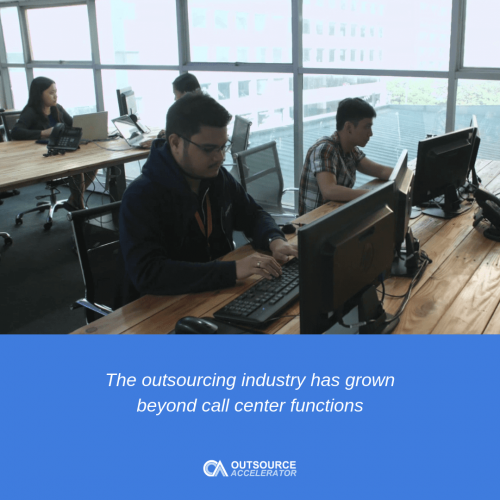
What can a PHP 30,000 monthly salary afford?
While a PHP 30,000 or USD 579 monthly salary may not look much from a western standpoint, this amount can provide individuals who are living in the Philippines with a decent standard of living. This amounts to around PHP 360,000 or USD 6,948 per year. Let’s take a look at how this works for regular employees:
According to the 2015 Family Income and Expenditure Survey released by the Philippine Statistics Authority in October 2016, the average Filipino family spends a total of PHP 215,000 or USD 4,150 every year or PHP 18,000 or USD 345 every month.
Those living in the NCR are revealed to have the highest annual average income of PHP 424,964 or USD 8,202 and highest annual average expenditure of PHP 348,901 or USD 6,753.
Food takes up the top spot in the list of expenses, consuming 41.9% of the annual budget. This is followed by house rent at 12.19%, utilities like water and electricity at 7.91%, miscellaneous expenses at 6.34%, and transportation at 6.21%.
In short, a PHP 30,000 salary can go a long way in providing individuals and families with their essential needs and opportunities to improve their living conditions.
Reduced labor costs and decent wages
Clearly, the Philippine BPO industry is providing Filipinos with good salaries. At the same time, it affords businesses with a chance to significantly reduce their labor costs and help employees sustain decent living conditions. From this perspective, outsourcing to the Philippines is a win-win solution for both employers and employees.
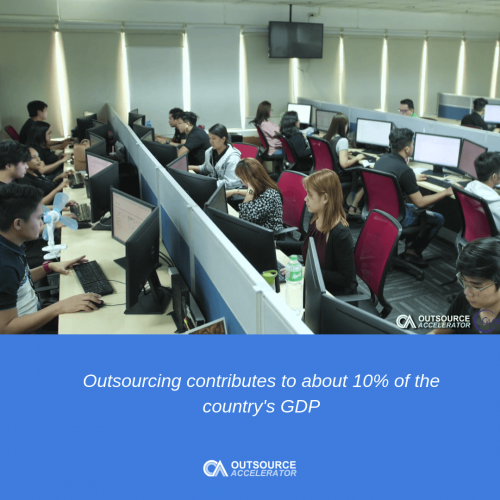
Beyond basic wages: human resource management
Aside from an employee’s basic pay, an employer must also pay attention to the following when items when computing an employee’s take-home pay.
• Labor laws
In the Philippines, the law is very much “pro-employee”. Contracts and laws are geared towards the benefit of the employee, although if you read everything, it is pretty fair and will also benefit the company. In this article, we will discuss the basic labor laws in the Philippines
• Employment
Just like other countries, the Philippines has a minimum employable age. You can apply for a professional job if you are 18 years old and above, although young adults aging from 15 – 18 can apply for certain jobs, as long as the workplace or the work itself is considered non-hazardous
When it comes to overseas employment, employers from different countries are not allowed to hire workers directly. They have to go through the board and entities that are authorized and certified by the Secretary of Labor.
• Rest days
Employees are entitled to at least 24 hours consecutive rest day per week. This is determined by the employer and should be discussed before the employee comes on board. In the Philippines though, companies usually give their employees 2 rest days per week. The days depend on the job description, the company, and the agreed schedule, but this is usually discussed even before the employee signs the contract
If an employee is required to come in on a Sunday or any rest day, they are entitled to an additional 30% on top of their regular daily pay. Companies should also respect the employees’ additional rest day requests regarding to their religious beliefs. Something that you should consider when building your virtual workforce
• Employer termination
In the Philippines, the employer has the right to terminate an employee anytime if they fail to meet the standards. Some of the most common reasons for termination are the following:
- Serious misconduct or disobedience to the employer
- Neglect of duties
- Commission of a crime by the employee
- And other reasons deemed by the company as unacceptable
It is best to get a certified lawyer or attorney when dealing with labor law cases in the Philippines, whether you are an employee or employer.
• Attendance
If the employee is entitled to a vacation leave and they decided to file it before or after a regular or special holiday, then the employee shall be paid for the holidays, even if they do not come to work on that same day. However, it is the company and the manager’s discretion if they will approve of such leaves.
On the other hand, if the employee is not yet entitled to paid vacation leaves and they decide to take a leave without pay before or after the holiday, then they might not get paid if they do not come to work during the holiday.
Tardiness is often deducted from the employee’s salary. It is the company’s discretion what amount they want to deduct from their employees. Be sure to factor this in your employee handbook about your company’s rules on tardiness.
• Leaves
Employees usually come in for a probationary employment, which lasts for 6 months. After 6 months, the company shall decide if they want to extend the probationary period, cease the employment, or regularize the employee. Once the employee becomes regularized, they are entitled to more or less 10 paid vacation and sick leaves
Maternity leaves are given to a pregnant employee. They are then entitled to a maternity leave benefit of 78 days for a cesarean delivery, and 60 days for a normal delivery. 60 days shall also be given to pregnant employees who have had a miscarriage. The employee shall receive a part(or her whole salary) of her monthly salary, which will be reimbursed by SSS to the company eventually.
Paternity leaves are granted to married men in the Philippines. They will be given a 7-day leave to care for their spouse after their delivery or miscarriage. This will, however, not be reimbursed by SSS.
Solo parents are also entitled to a 7-day leave, as long as they have been working for the company for at least a year.

Different kinds of leaves in the Philippines
Every employee who has stayed with the company for least 1 year is entitled to a service incentive leave (SIL) with 5 days of pay. This leave may be used for sick leaves and vacation leaves. At the end of the year, unused SIL may be converted to cash.
• Parental leaves
There are 3 kinds of parental leaves. These are:
- Maternity leave – A pregnant employee is entitled to a 60-day maternity leave for a normal delivery or miscarriage or to up to 78 days for a cesarean delivery. This leave is applicable to up to 4 pregnancies. During this type of leave, the employee receives a fraction of her regular monthly salary, which the SSS will reimburse to the employer. The leave may take effect at least 2 weeks before the employee’s due date.
- Paternity leave – Married male spouses are entitled to a paternity leave of up to 7 days for when their legitimate spouse, whom they are living with, delivers or miscarriages. Paternity leaves are shouldered by the company and applicable to up to 4 pregnancies.
- Solo-parent leave – Solo parents who have been with the company for at least a year are entitled to 7 leaves per year.
• Other leaves
- Gynecological leave – This leave, which follows a surgery that addresses gynecological disorders, is for employees who have rendered at least 6 months of service in the past 12 months. It entitles the employee to a special 2 month leave benefit with full pay.
- Leave for women and their children who are victims of violence – Victims of violence are entitled to a special paid leave of up to 10 days, but it can be extended as needed.
Work hours, jobs, and rates
The normal and allowable working hours in the Philippines is 8 hours per day. If employees are required to work beyond those hours, then it is the company’s responsibility to pay them additional fees for the hours rendered. 40 hours is the maximum per week, although the law allows companies to employ part-time employees, which usually work less than 8 hours (usually half the time, which is 4 hours). The usual overtime rate in the Philippines is 25% of the hourly pay rate during regular work days, and 30% of the hourly rate during rest days, regular, and special holidays.
Every employee in the Philippines is entitled to overtime pay, except for the following: managerial personnel, piece rate workers, government employees, house helpers, and non-agricultural field personnel.
In the Philippines, employees are subject to receiving a “night differential pay”. Since most BPO clients are from the USA or the UK, most of the employees come to the office at night. This is the reason why employees receive an additional 10% if they work between the hours of 10 PM – 6 AM. They receive the ND on top of their regular pay, and sometimes, it even comes with a “hazard pay” to cover the employee for coming in at night.
Overtime pay
The minimum wage is based on a workweek of 40 hours or 8 hours per day. The 60-minute lunchbreak that employees have daily is not counted as a work hour and is not compensated. Overtime pay is given to employees if they need to work beyond the regular 8-hour work shift.
- On regular days, employees should get an extra 25% of their hourly pay rate for every overtime hour rendered.
- On rest days and regular or special holidays, they should get an extra 30% of their hourly rate on that specific rest day or holiday for every extra hour rendered.
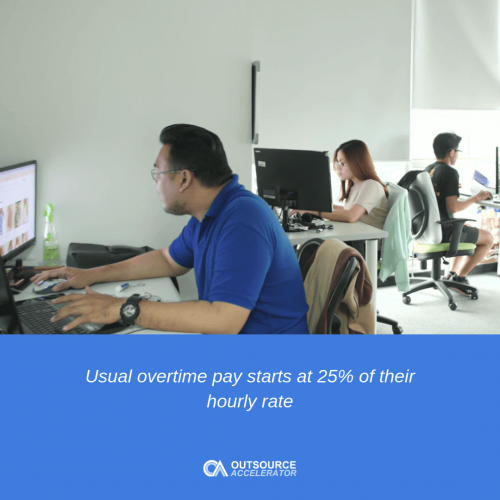
Premium wage
Employees that report for work on rest days and special holidays receive premium wages. There are 3 special holidays in the Philippines: Ninoy Aquino Day, All Saints Day, and the Last Day of the Year.
- On rest days or special holidays, employees get an additional 30% of their daily basic rate.
- On rest days that also fall on special holidays, employees get an additional 50% of their daily basic rate.
- On regular holidays that also fall on rest days, employees get an additional 30% based on their regular holiday rate of 200%.
“No work no pay” is a principle that applies on special non-working holidays and other special days proclaimed by the President of the Philippines. This means that employees who take time off work on holidays that are declared “no work no pay” will not be getting paid for that date.
Philippine holidays and payments in outsourcing
The Philippines is a very festive country and therefore, we have a lot of holidays listed every year. There are two types of holidays in the Philippines: Special and Regular. It is the company’s discretion if they want their employees to come in during a regular or special holiday.
If they decide to have the employees come to work during a special holiday, then they must pay the employee an additional 30% on top of their regular daily pay. For regular holidays, the company must pay the employee double of their regular daily pay, if they ever decide to have the employee come in during that specific regular holiday.
For both regular and special holidays, the company must pay the employee even if they do not come to work during that day, as long as both parties have agreed to it. In the Philippines though, BPO employees are used to coming to work during holidays, as this is usually what BPO companies require. The Philippines, USA, Australia, and the UK have different sets of holidays and thus, it is the company’s discretion which set of holiday they want the company and its employees to follow.
The 12 regular holiday days listed about are really just the tip of the iceberg. In practice, there can be as many as 25-30 holiday days in a year. Once you add an employees annual holiday, and sick-leave allowance (it’s worth noting here also that sick leave rates are generally higher in Philippines than a lot of other countries) – it can start to have a dramatic impact on productivity.
The holiday ‘system’, can also be slightly confusing, as some special holidays can be announced only days or weeks before the day, other holidays can be isolated or localised to different areas, or communities (ie just a part of Manila), and some holidays are celebrated holidays, but aren’t non-working days.
When outsourcing to the Philippines, the holiday policies really need to be discussed and understood in advance. Mastering Philippines holidays is one thing, but it gets even more complex when you are coordinating the Philippines holidays with another countries holidays.
Unless a conscious, pragmatic approach to holidays is taken, you can really lose a lot of productivity. Not only that, it is not uncommon for workplace frustrations and jealousy to occur as a result of one team (in one country) getting more holiday than another team (in another country).
On the upside, the outsourcing industry is very familiar with working shift work, and commonly covering all holidays (even Christmas if necessary). The employer has to pay higher rates for people working on holidays, but this can often be a win-win, as the employees appreciate the extra pay, and the bump in pay, really isn’t that significant for most Western employers.
The key is to be aware of the holidays (in both countries), and be clear about a holiday policy. So that you can be clear, the employer needs to know what their needs are for their business, and clients. Many people come to Philippines because of a 24/7 customer support need. So in that case, it is obvious that a full cover is needed regardless of holidays. Others might just want Monday to Friday – and available for all working days in their ‘home country’.
Holidays are not a major hurdle, if you are aware in advance, and make good policies to manage them.

Holiday pay
Employees that don’t go to work on a regular holiday are entitled to their basic daily wage. Should they report for work on that day and render a complete 8-hour shift, they are entitled to 200% of their daily wage. If the holiday falls on a rest day, employees get an additional 30% based on their holiday rate, which totals to 260% of their regular daily rate.
There are 12 regular holidays in the Philippines. These are:
- New Year’s day
- Maundy Thursday
- Good Friday
- Araw ng Kagitingan
- Labor Day
- Independence Day
- National Heroes’ Day
- Eidl Fitr
- Eidl Adha
- Bonifacio Day
- Christmas Day
- Rizal Day
Night shift differential
Employees who are scheduled to work between 10pm to 6am are entitled to an additional 10% premium for every regular work hour.
13th month pay
The 13th month pay is a taxable and mandatory benefit that employers must provide their employees. This is usually given to managerial and rank and file employees during the 11th or 12th month of every year (but no later than December 24th of every year).
The employee must be working for at least one month for the company for them to be able to receive their thirteenth-month pay
According to DOLE, the thirteenth-month pay must not be less than 1/12 of the employee’s basic salary for the whole calendar year. Separated and resigned employees are entitled to a pro-rated 13th-month pay, which will usually be included in their back pay
The 13th month pay is different from a Christmas bonus, while the 13th month bonus is mandated by law, the Christmas bonus is a separate payout and entirely up to the employer if they wish to do so or not. The Christmas bonus can come in other non-monetary forms such as Gift Certs, Christmas Baskets, team building activities, etc
Gross benefits and de minimis benefits
Gross benefits include 13th month pay, Christmas bonuses, incentive and productivity bonuses, and other benefits, in cash or in kind, of the same nature. These are exempt from tax as long as the total amount falls below PHP 90,000 or around USD 1,738.

• De minimis
De Minimis benefits are usually what companies that have outsourced in the Philippines choose to reward their employees. It is much easier to give, and seem more thoughtful since the gifts seem to be more personal. The employees often get motivated with de minimis benefits as well, because aside from their salaries, they get extra pampering from their employers.
- Medical cash allowance for dependents, or a discounted or completely free of charge medical health card
- More or less 10 days vacation and sick leave
- Parental leaves including maternity, paternity, and solo parent leaves
- Emergency Leaves (company’s discretion)
- If the vacation leaves are unused, some or all of it can be converted to cash
- A total of 1,500 PHP for rice subsidy, or one sack of rice every month
- Clothing allowance (not exceeding 5,000 PHP per year)
- Medical benefits including a health card (the annual limit will always depend on the company and the plan)
- Laundry Allowance
- Additional employee achievement awards (these are very common in the BPO industry, as companies usually form teams made up of call centre agents and whoever hits the target or goes beyond it usually gets bonuses and incentives). It can be in a form of a tangible personal property, cash, or gift certificates
- Daily meal allowance in case the need for overtime work arises
• Loans
Companies in the Philippines usually offer help to their employees regarding loans. The employee must be staying with the company for more than 6 months though, and they have to be regularized. Employees can apply for automobile, housing, and even business loans with the help of their company. A certain amount shall be deducted from the employee’s salary every month to cover the fees for the loan.
Employees must be careful when applying for loans though, as they have to make sure that they can pay the monthly contribution. Failure to pay can lead to huge interest rates and penalties, which can be much harder to pay off.
• Separation and retirement
Every single employee in the Philippines must be given their separation and retirement pay once they decide to cease their employment with the company that they are working for.
According to articles 283 and 284 of the labor code of the Philippines, an employee is entitled to claim their separation pay if their contract ended or has been seized under authorized causes. Employees who are terminated due to negligence, crime, fraud, or broke a rule from the contract and the law are not entitled to a separation pay.
Separation pay for ½ month pay can be claimed due to the following circumstances:
- The employee contracted an incurable and infectious disease which can be hazardous to other employees, thus leading to cessation of contract
- The business and/or company recently experienced serious losses or financial difficulties, thus leading to cessation of operations
- Loss prevention or retrenchment of person
Separation pay for 1-month pay can be claimed due to the following authorized causes:
- Employee and/or task redundancy
- Labor-saving devices
- When the company cannot reinstate the employee for reasons beyond the employer’s control
Both the employer and the employee has the right to terminate the written contract anytime through a written notice. Both the employer and employee shall give a 30-day notice before the contract cessation date
Employees who have reached the age of 60 have the option to retire. When they reach the age of 65 though, retirement is compulsory
Retirees must have served the company for 5 years and above for them to be qualified to receive a retirement pay. The pay must be equivalent to ½ of a month’s salary for every year of service. Each ½ month salary must include 15 days of salary based on the last pay, ½ of the 13th-month pay and five days of incentive leaves
Both separation and retirement fees are only made possible if you have your own business set up in the Philippines. Otherwise, the third-party BPO company will be the one to take care of such
A lot of companies in the United States, the United Kingdom, Australia, and other countries have tried outsourcing in the Philippines, and the success rate is amazing. According to Credit Donkey, over 90% of the companies look into outsourcing to cut costs. They have tried it, and the never looked back

A closer look at mandatory deductions and benefits
Every month, taxes and mandatory benefits are deducted from an employee’s basic salary. These are:
• Taxes
The enactment of the TRAIN Law in early 2018 resulted in the lowering of the personal income tax. Employees who are earning up to PHP 250,000 or USD 4,829 are exempted from paying tax. The Department of Finance (DoF) has a convenient calculator that can help employees find out their deductibles, including how much they have to contribute to the SSS, PhilHealth, and HDMF.
• Social Security System
The Social Security System or SSS is a mandatory social insurance program run by the state and provides various benefits to all professional, private, and informal employees in the country. SSS members can use the following benefits:
- Sickness – Members will receive a daily cash allowance if they are not able to work due to illness or injury.
- Maternity – Female members who are unable to work due to pregnancy or miscarriage are granted a daily cash allowance.
- Disability – Members who have become partially or totally and permanently disabled will receive cash benefit in the form of a monthly pension or a lump sum amount.
- Retirement – Members who can no longer work due to old age are granted a cash benefit in the form of a monthly pension or a lump sum amount.
- Death – This cash benefit, which can come in the form of a monthly pension or a lump sum amount, is granted to the beneficiaries of a deceased member.
- Funeral – This cash benefit is given to whoever paid the burial expenses of a deceased member.
- Salary loan – This cash loan is granted to currently paying voluntary, self-employed, and employed members.
Government employees have their own version of the SSS, which is the GSIS or Government Service Insurance System.
• PhilHealth
PhilHealth covers the employee’s additional medical expenses. This is mandatory and automatically deducted from your monthly pay. Just like SSS contributions, both the employer and employee are tasked to pay PhilHealth contributions each month.
PhilHealth contributions can be used by the employee in case a medical emergency arises. If you are connected with a company, then you can ask the HR about your monthly contributions. If you are a freelancer or you have your own business, then you might want to cover the contributions yourself.
• Pag-IBIG
Pag-IBIG or the Home Development Mutual Fund (HDMF) covers the employee when it comes to housing loans. It is mandated by the law and is a compulsory monthly contribution, especially for professionals that are working in a company.
The HDMF covers the Filipino workers by establishing a legal savings program for an affordable housing financing system. The employee then has the privilege to apply for short-term loans and an access to low-cost housing programs after a certain period of contribution.
Here is a sample computation for PhilHealth contributions: if the employee earns PHP 1,500 or less per month, then they must contribute at least 1% per month. If they earn a total of 1,500 PHP and above per month, then they must contribute at least 2% of their monthly compensation. The maximum employee contribution is set at 5,000 PHP, while the minimum is 100 PHP.
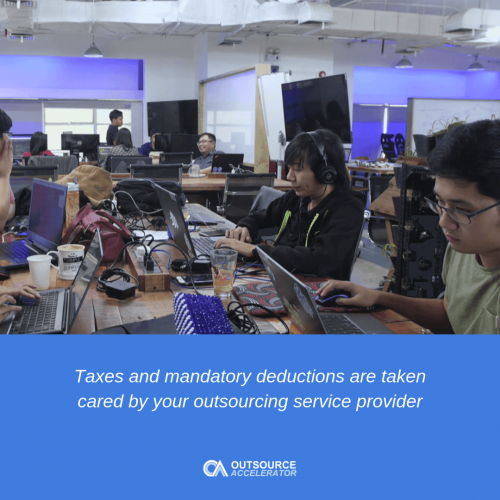
How employment via outsourcing can benefit your business
As a decision maker in a small to mid-sized enterprise, it’s in your best interest to take a closer look at outsourcing and see if it’s a sustainable option that can help your business thrive. SMEs typically outsource processes that don’t directly affect the core processes of their business, such as logistics and accounting.
In comparison to big corporations that can support various departments, SMEs typically don’t have the extra resources or manpower to take care of these processes. While this situation may seem limiting from the outset, it can present a smaller business with opportunities to cut costs and increase profits.
Here are some of the benefits that your company stands to earn by outsourcing processes that are not central to your business operations:
1. Focus on core tasks
Payroll and finance are just some of the functions that are critical to the business, but since they don’t generate sales, it makes sense not to devote significant manpower to these tasks. You can choose to assign these to your HR team, but it’s highly likely that they already have their hands full with keeping the rest of the team focused on the core functions of the business.
Non-core functions should still be handled by the appropriate professionals, and SMEs shouldn’t be tempted to take care of these on their own if these activities are outside their skillset. Businesses get the highest benefit by focusing on their strengths and outsourcing functions that are not within their core competencies.
Instead of letting an overwhelmed or inexperienced employee handle sensitive information and risk making mistakes in the process, it is best if these tasks are relegated to qualified professionals who can thoroughly and competently perform the function.
2. Cut down overhead costs
Hiring a provider is definitely a more cost-effective option compared to implementing, for example, a content creation team, staffing it, and managing it. Businesses that choose to outsource can simply improve their service plan as they scale up, but those that choose to invest in in-house manpower and technology to handle non-core processes need to funnel more funds to these departments as the company continues to grow.
As it stands, the cost of partnering with a provider will always be lesser compared to hiring, training, and retaining new employees. But you don’t have to look far in the future to see how outsourcing can benefit the company.
Just remember that time is money and, right now, it is best spent doing activities that are central to the business. Outsourcing gives you more time and resources to spend on activities that earn money for your company, like improving your services and products and widening your client base.
3. Specialized BPO services
BPO companies that handle particular processes such as finance and customer service, invest in technologies that will make the work easier and faster for their employees. This allows them to improve productivity without sacrificing the quality of the work that they do.
At the same time, they have specialists that look into the various laws and changes that affect the way they do business. BPO companies that handle taxation, for example, keep themselves on top of rules and changes that affect their particular area of expertise.
By outsourcing work to specialists, your company can expect accurate and timely work, benefit from the latest technology, and use the expertise of trained professionals. Best of all, these can be enjoyed simply by paying a minimal fee and without shelling out extra resources to invest in technology, training, or manpower.
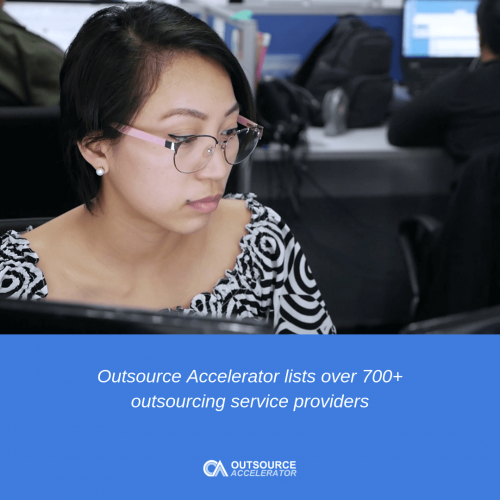
4. Staff leasing
One of the major benefits of working with a BPO is that they handle all of the labor laws and salary administration of ‘your’ employees. The Philippines has a very pro-labor environment, and it is a highly bureaucratic system with a huge amount of red tape. It is best – especially when new to Philippines – to keep as far away from the bureaucracy as possible.
If you establish a good partnership with a good BPO then they will not only source and hire your team for you, but they will manage the employment administration, manage all compliance and payments – and advise you on best practice and ‘prices’
It’s also most common for the BPO’s to cover the cost of the staff’s 13th month within their monthly desk/service fee – which is a considerable amount when all added up
The BPO’s can – to some degree – ‘cloak’ you from the many arduous employment administration processes. However, the BPO’s do have their hands somewhat tied, in that they themselves still have to comply with the labor laws of the country.
This means that if you wish to terminate an employee or want to demote or reprimand someone, you will need to follow their suggested guidance. You might think that since you are hiring the BPO on a contract basis, and that the employees are then effectively contracted employees that you can freely hire and fire.
This certainly isn’t – commonly – the case. You will be surprised to find that the labor laws are generally much more protectionist towards staff than they are in UK, US or Australia – and even when you are contracting services, it is still very hard for you (via the BPO) not to abide by the strict processes.
This is both a good thing and a bad thing, as it ensures good employment environment for the staff, and avoids exploitation. And in practice, it generally isn’t that restrictive on the employers – but it is something to be aware of in advance.
It is always sensible to fully understand the discipline and termination options and processes that any potential BPO partner expects from you.







 Independent
Independent




